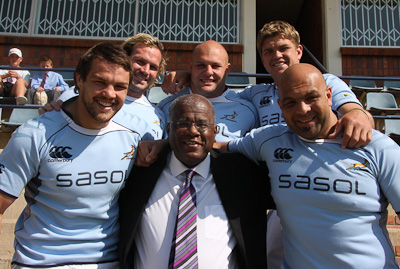Latest News Archive
Please select Category, Year, and then Month to display items
12 January 2024
|
Story Nonsindiswe Qwabe
|
Photo Sonia Small
 Since joining the UFS in 2008, Dr Grey Magaiza has worked extensively on approaches that can foster the socio-economic transformation of societies.
Since joining the UFS in 2008, Dr Grey Magaiza has worked extensively on approaches that can foster the socio-economic transformation of societies.
“The future should be one where communities can decide on their development agenda and futures. That’s the most important for me.” Dr Grey Magaiza, Deputy Director of the Centre for Gender and Africa Studies (CGAS) and Head of the Community Development programme on the Qwaqwa Campus, is passionate about capacitating communities to be agents of change and advancement. His vision for the future emphasises the empowerment of communities to take charge of their development by actively participating in decision making and the implementation of development projects that can improve their lives.
Since joining the UFS in 2008, Dr Magaiza has worked extensively on approaches that can foster the socio-economic transformation of societies. Over the years, he has crafted his research speciality into one that he is most proud of – being an interdisciplinary scientist immersed in the development of communities.
“I’m in a fortunate position of researching what I like. I say ‘fortunate’, because I’ve taken the time to understand what I’m passionate about, which is the overall field of rural livelihoods and livelihood futures – in short, community development. My research starts from an engaged university, understanding the elements that a university must use to enhance transformation and relevance to its immediate community in terms of development.”
One of the ways he has done this is by looking at social entrepreneurship as a development approach for young people in a rural setting. Through workshops with non-profit and civic organisations in Qwaqwa, Dr Magaiza has been helping these organisations to map out their needs and actively meet them through the involvement and support of external role players.
“We understand that communities are part of the national development agenda, but even that national agenda respects community knowledge and intentions and allows communities to shape their identity. A critical enabler of this is community organising. You bring back the capacity in communities to have dialogues on issues affecting them as spaces for engagement, knowledge exchange, and for people to just talk about their way forward.”
By enabling communities to define their development agenda, they can address their specific needs, challenges, and aspirations, he said. “When I look at livelihood futures, it’s quite an exciting aspect of my work – it’s like looking into a fortune tellers’ globe, because you’re not deciding for communities what they should do, but the communities themselves take those decisions.”
Springboks choose Kovsies' sports facilities
2010-09-02
 |
|
The Springbok team boasts five former Kovsies. From the left, front, are: Flip van der Merwe, Prof. Jonathan Jansen, Rector and Vice-Chancellor of the UFS, and Gurthro Steenkamp. At the back, from the left, are: Jannie du Plessis, C.J. van der Linde and Juan Smith.
Photo: Gerhard Louw
|
Over the years the University of the Free State (UFS) has already produced 67 Springbok and 22 Springbok Sevens players. Therefore it comes as no surprise that the Springboks have chosen the UFS’s sports facilities in preparation for their match against Australia this coming Saturday. They will tackle Australia at the Free State Vodacom Park at 17:00. Five former Kovsies are included in this team. They are Flip van der Merwe, Gurthro Steenkamp, Jannie du Plessis, C.J. van der Linde and Juan Smith.
Kovsies have been providing quality rugby for many decades already. During the 2009 rugby season the UFS rugby club produced 12 players for national teams and 73 players for provincial teams (all age groups). This does not include all the former Kovsies. According to Mr Rockey le Roux from KovsieSport at the UFS, there is currently not one South African Super 14 team that does not include a Kovsie or former Kovsie.
The UFS is also equipped to produce top rugby players. Shimla Park is the main field of Shimla rugby, where all the Shimla games are played. Some of the Varsity Cup games are also played on this field. Boom Prinsloo, the Shimla player named as the 2010 player of the Varsity Cup tournament, is included in the current Springbok Sevens practice team. Shimla Park boasts 1 000-lux lights, which let this field comply with international standards.
There are four more rugby fields that are used for residence rugby. Currently 26 rugby teams of the university's residences and three provincial teams practise on the fields.